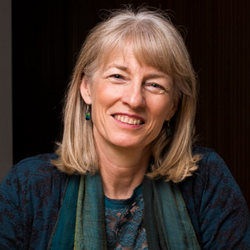Using her research to explore human rights, Kathryn Sikkink, Ryan Family Professor of Human Rights Policy at Harvard Kennedy School, works on international norms and institutions, transnational advocacy networks, the impact of human rights law and policies, and transitional justice.
Sikkink will deliver her lecture, titled “Exploring the Diverse Origins of International Human Rights,” at 2 p.m. Friday, July 15, in the Hall of Philosophy to close Week Three of the Interfaith Lecture Series “The Spirituality of Human Rights.”
“Some people have made the argument that human rights have been kind of a secular replacement for religion,” Sikkink said. “And some people who make that argument see human rights as being a secular tradition very much associated with the West, and particularly with Christianity with Europe and the United States.”

Her work dives into understanding how the diverse origins of human rights correlates with international protections of those rights, an idea dating before World War II.
“I discovered that this idea, that international rights should be protected internationally, … it does not just come from the United States and Western Europe,” Sikkink said. “That’s a misunderstanding of the origins of human rights and, as such, it does not just come from one religion or from one religious tradition.”
Sikkink said she believes there’s a spirituality to human rights that can call on people to put human well-being and dignity first.
“I do hope I make people question what has become almost a commonplace routine of human rights,” Sikkink said — that human rights, conceived by the Global North, focus on the countries of the Global South, with no say or involvement from those actual countries.
Sikkink used her book Evidence for Hope: Making Human Rights Work in the 21st Century to document the diverse origins of human rights, discovering Latin American and smaller countries played an important role.
Human rights don’t come from one religious tradition, Sikkink said, but human rights and dignity offer an association with certain religions that some may find more appealing.
“Most religions in the world have concepts of human dignity,” Sikkink said. “In that sense, human rights, which is focused on putting human dignity at the center of our work in our lives, has similarities with many different religions that also focus on human dignity.”
When she was an undergraduate student, Sikkink received a scholarship to study abroad in Uruguay in 1976. At the time, Uruguay was under military dictatorship control; seeing this led her to work in human rights advocacy.
“My work suggests that human rights have been effective tools … for promoting human well-being,” Sikkink said. “That’s something that I would like people to know, that is not just wishful thinking. It’s not just a bunch of idealists, but that these have actually been concrete tools people have used to improve their lives.”




